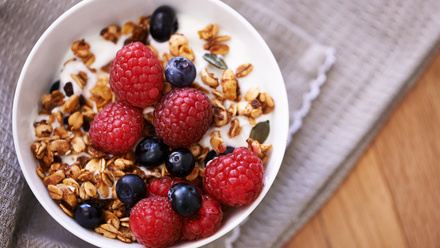Arthritis is a condition that causes joint pain. This Food Fact Sheet is about the role diet has in managing symptoms of the most common arthritic condition, osteoarthritis.
What is osteoarthritis?
Osteoarthritis (OA) commonly affects the large joints such as the knees and hips but frequently occurs in the hands, the base of the big toe and the spine. It is a condition that affects the whole joint. Cartilage breakdown and inflammation can lead to pain, discomfort and a reduced quality of life.

In the UK, it is the fastest growing cause of disability. More people are getting osteoarthritis alongside a rise in obesity, which is a major risk factor. Osteoarthritis may run in families or can develop as a result of injury and often affects people later in life.
There is currently no cure for osteoarthritis, so treatment options are generally limited to the management of pain and symptoms. Though there is no evidence that food exclusion is effective in osteoarthritis, there are dietary strategies that may help you to ease its symptoms.
Maintaining a healthy weight
The most important relationship between diet and osteoarthritis is weight. If you have obesity or overweight this increases the strain on joints. Excess fat also causes inflammation which can exacerbate symptoms. There is strong evidence that losing weight can reduce pain and improve physical function and mobility.
If you have overweight or obesity, losing at least ten per cent of your body weight will give most benefit, not only for symptoms but for overall health. Try to eat a healthy diet with plenty of fruits and vegetables.
Incorporating exercise alongside dietary changes helps to maintain muscle while losing weight. This has been shown to increase physical function. Osteoarthritis has been linked to cardiovascular disease. Losing excess weight will also help to prevent or manage this.
Find out more in our Healthy Eating and Weight Loss fact sheets.
What fats should I be consuming?
The long-chain omega-3 polyunsaturated fatty acids found in oily fish have anti-inflammatory properties that may well be of benefit in osteoarthritis.
Aim to consume two portions of fish per week, one of which should be oily, e.g., sardines, mackerel or salmon. If this is not possible you could consider a trial of fish-oil capsules at a dose that would provide a similar amount (450 mg EPA and DHA per daily adult dose). While more evidence is needed to show clear benefits of taking fish oil for osteoarthritis symptoms, this dose improved pain and function in a trial on knee osteoarthritis patients and is the dose recommended for reducing cardiac death.
Omega-6 polyunsaturated fats (found in sunflower, safflower, corn and grapeseed oils) are somewhat pro-inflammatory so may make symptoms worse, as may saturated fats (mainly found in animal products). Replace them with oils and spreads rich in mono-unsaturated fats like rapeseed oil and olive oil.
Find out more in our Fats fact sheet.
Cholesterol reduction
Osteoarthritis patients are more likely to have raised blood cholesterol. There is some suggestion that cholesterol metabolism is linked to osteoarthritis development and that lowering blood cholesterol will improve osteoarthritis. In any case, if blood cholesterol is raised, it is important to make dietary changes to lower it – this will also benefit cardiovascular health.
Collective dietary measures include:
- replacing foods high in saturated fat with foods high in unsaturated fat
- increasing the intake of dietary fibre
- eating nuts (30g per day)
- 1.5-3g /day of plant stanols/sterols - these can be found in fortified drinks, spreads, and yogurts
- consuming soy protein (25g /day) e.g. tofu, soy milk, soy beans /edamame beans
Find out more in our Cholesterol and Stanols and Sterols fact sheets.
Antioxidants
Antioxidants are found in certain animal and plant products. They protect the body from damaging oxidation or ‘oxidative stress’ which may be involved in the development and progression of osteoarthritis. Though evidence for the effect of these vitamins in osteoarthritis is limited, you should aim for an adequate daily intake as part of a healthy balanced diet.
The importance of vitamin D
Vitamin D is essential for bone and cartilage health. Studies have shown that it may have a positive effect on muscular strength and balance, particularly quadricep strength. Between April to October in the UK, sunlight is the primary source of vitamin D. It can also be obtained from dietary sources.
Find out more in our Vitamin D fact sheet.
Vitamin K
Vitamin K may influence osteoarthritis through its role in making bone and cartilage. Sources include kale, spinach, broccoli, Brussels sprouts, eggs, chicken, bacon, ham, Norwegian Jarlsberg and Swiss Emmental cheeses. Certain fats and oils (e.g. olive oil, margarine) contain small amounts of vitamin K and may also help its absorption from foods.
Gut health and dietary fibre
Fibre has a role in improving gut health because of its anti-inflammatory properties in the intestine. Currently, most people in the UK do not meet fibre recommendations. Aim to increase dietary fibre by consuming a range of fruits, vegetables, beans, pulses, nuts, seeds and wholegrains. This will provide a good level and diversity of gut bacteria, as well as helping with weight loss.
Read our Fibre fact sheet for more info.
Food avoidance
Several popular diet books on arthritis advocate avoiding foods such as dairy products or nightshade vegetables (tomatoes, potatoes, bell peppers and aubergines). Though there is some evidence that food avoidance may help people with rheumatoid arthritis, there is no evidence of benefit for people with osteoarthritis.
Dietary supplements
There is no good trial evidence to show that glucosamine, chondroitin, rosehip or turmeric help osteoarthritis symptoms. If your diet is restricted or your appetite is poor, consider taking a multivitamin/mineral supplement containing recommended intake amounts.
Find out more in our Supplements fact sheet.
Top tips
- If you have overweight or obesity, aim to reduce your body weight by at least ten per cent. Combining regular exercise with healthy eating to achieve weight loss is the most effective strategy to reduce joint pain.
- Aim for a healthy BMI, i.e. between 18.5 and 25 kg/m2.
- Regular exercise is likely to help symptoms by preserving muscle strength.
- Consume one to two portions of oily fish a week. If you cannot do that, consider taking a fish-oil supplement.
- Use oils rich in mono-unsaturates (e.g. rapeseed oil and olive oil).
- Take dietary action to reduce your blood cholesterol, if elevated.
- Take a vitamin D supplement of 10-25 µg/day when you are not being exposed to the sun, including in the winter months. During the summer months, aim for daily sunlight exposure (10 - 15 minutes without sunscreen) to increase vitamin D.
- Consume rich sources of vitamin K and antioxidants as part of a healthy balanced diet.
- Maintain a good intake of dietary fibre from a range of sources.
- Discuss any change in diet or nutritional supplements with your rheumatologist, GP or dietitian.
Source(s)
Hunter DJ, Bierma-Zeinstra S. Osteoarthritis. Lancet 2019; 393(10182): 1745-59
Fu K, Robbins SR, McDougall JJ. Osteoarthritis: the genesis of pain. Rheumatology (Oxford) 2018; 57(suppl_4): iv43-iv50.
Kolasinski SL, Neogi T, Hochberg MC, et al. 2019 American College of Rheumatology/Arthritis Foundation Guideline for the Management of Osteoarthritis of the Hand, Hip, and Knee. Arthritis care & research 2020; 72(2): 149-62.
Veen L, Hantikainen E, Bellocco R, Ye W, Serafini M, Ponzano M, Grotta A, Trolle Lagerros Y. Dietary antioxidants, non-enzymatic antioxidant capacity and the risk of osteoarthritis in the Swedish National March Cohort. Eur J Nutr. 2021 Feb;60(1):169-178. doi: 10.1007/s00394-020-02239-8. Epub 2020 Apr 2. PMID: 32242259.https://pubmed.ncbi.nlm.nih.gov/32242259/
Tantavisut S, Tanavalee A, Honsawek S, Suantawee T, Ngarmukos S, Adisakwatana S, Callaghan JJ. Effect of vitamin E on oxidative stress level in blood, synovial fluid, and synovial tissue in severe knee osteoarthritis: a randomized controlled study. BMC Musculoskelet Disord. 2017 Jun 29;18(1):281. doi: 10.1186/s12891-017-1637-7. PMID: 28662656; PMCID: PMC5492918.
Tu L, Zheng S, Cicuttini F, Jin X, Han W, Zhu Z, Antony B, Winzenberg T, Jones G, Gu J, Wluka AE, Ding C. Effects of Vitamin D Supplementation on Disabling Foot Pain in Patients With Symptomatic Knee Osteoarthritis. Arthritis Care Res (Hoboken). 2021 Jun;73(6):781-787. doi: 10.1002/acr.24371. PMID: 32623812.
Zhao ZX, He Y, Peng LH, Luo X, Liu M, He CS, Chen J. Does vitamin D improve symptomatic and structural outcomes in knee osteoarthritis? A systematic review and meta-analysis. Aging Clin Exp Res. 2021 Sep;33(9):2393-2403. doi: 10.1007/s40520-020-01778-8. Epub 2021 Mar 30. PMID: 33783714.
Manoy P, Yuktanandana P, Tanavalee A, Anomasiri W, Ngarmukos S, Tanpowpong T, Honsawek S. Vitamin D Supplementation Improves Quality of Life and Physical Performance in Osteoarthritis Patients. Nutrients. 2017 Jul 26;9(8):799. doi: 10.3390/nu9080799. PMID: 28933742; PMCID: PMC5579593.
Tripathy SK, Gantaguru A, Nanda SN, Velagada S, Srinivasan A, Mangaraj M. Association of vitamin D and knee osteoarthritis in younger individuals. World J Orthop. 2020 Oct 18;11(10):418-425. doi: 10.5312/wjo.v11.i10.418. PMID: 33134104; PMCID: PMC7582112.
Perry TA, Parkes MJ, Hodgson R, Felson DT, O'Neill TW, Arden NK. Effect of Vitamin D supplementation on synovial tissue volume and subchondral bone marrow lesion volume in symptomatic knee osteoarthritis. BMC Musculoskelet Disord. 2019 Feb 14;20(1):76. doi: 10.1186/s12891-019-2424-4. PMID: 30764805; PMCID: PMC6376763.
Ramasamy B, Magne F, Tripathy SK, Venugopal G, Mukherjee D, Balamurugan R. Association of Gut Microbiome and Vitamin D Deficiency in Knee Osteoarthritis Patients: A Pilot Study. Nutrients. 2021 Apr 13;13(4):1272. doi: 10.3390/nu13041272. PMID: 33924396; PMCID: PMC8069973.
Oka H, Akune T, Muraki S, et al. Association of low dietary vitamin K intake with radiographic knee osteoarthritis in the Japanese elderly population: dietary survey in a population-based cohort of the ROAD study. J Orthop Sci 2009; 14(6): 687-92.
Neogi T, Booth SL, Zhang YQ, et al. Low vitamin K status is associated with osteoarthritis in the hand and knee. Arthritis Rheum 2006; 54(4): 1255-61.
Simes DC et al. Nutrients 2020, 12: 138; doi:10.3390/nu12010138
Shea MK, Kritchevsky SB, Hsu FC, et al. The association between vitamin K status and knee osteoarthritis features in older adults: the Health, Aging and Body Composition Study. Osteoarthritis and cartilage 2015; 23(3): 370-8.
Misra D, Booth SL, Tolstykh I, et al. Vitamin K deficiency is associated with incident knee osteoarthritis. Am J Med 2013; 126(3): 243-8.
Neogi T, Felson DT, Sarno R, Booth SL. Vitamin K in hand osteoarthritis: results from a randomised clinical trial. Ann Rheum Dis 2008; 67(11): 1570-3.
Shea MK, Loeser RF, McAlindon TE, Houston DK, Kritchevsky SB, Booth SL. Association of Vitamin K Status Combined With Vitamin D Status and Lower-Extremity Function: A Prospective Analysis of Two Knee Osteoarthritis Cohorts. Arthritis care & research 2018; 70(8): 1150-9.
Shea MK, Loeser RF, McAlindon TE, Houston DK, Kritchevsky SB, Booth SL. Association of Vitamin K Status Combined With Vitamin D Status and Lower-Extremity Function: A Prospective Analysis of Two Knee Osteoarthritis Cohorts. Arthritis care & research 2018; 70(8): 1150-9.
Biver E, Berenbaum F, Valdes AM, Araujo de Carvalho I, Bindels LB, Brandi ML, Calder PC, Castronovo V, Cavalier E, Cherubini A, Cooper C, Dennison E, Franceschi C, Fuggle N, Laslop A, Miossec P, Thomas T, Tuzun S, Veronese N, Vlaskovska M, Reginster JY, Rizzoli R. Gut microbiota and osteoarthritis management: An expert consensus of the European society for clinical and economic aspects of osteoporosis, osteoarthritis and musculoskeletal diseases (ESCEO). Ageing Res Rev. 2019 Nov;55:100946. doi: 10.1016/j.arr.2019.100946. Epub 2019 Aug 19. PubMed ID 31437484.
Liu Y, Ding W, Wang HL, Dai LL, Zong WH, Wang YZ, Bi J, Han W, Dong GJ. Gut microbiota and obesity-associated osteoarthritis. Osteoarthritis Cartilage. 2019 Sep;27(9):1257-1265. doi: 10.1016/j.joca.2019.05.009. Epub 2019 May 27. PMID: 31146016.
Dai Z, Niu J, Zhang Y, Jacques P, Felson DT. Dietary intake of fibre and risk of knee osteoarthritis in two US prospective cohorts. Ann Rheum Dis 2017; 76(8): 1411-9.
Han HS, Chang CB, Lee DC, Lee JY. Relationship between Total Fruit and Vegetable Intake and Self-Reported Knee Pain in Older Adults. J Nutr Health Aging. 2017;21(7):750-758. doi: 10.1007/s12603-016-0842-7. PMID: 28717804.
NDNS 2021: COVID-19 and diet https://assets.publishing.service.gov.uk/government/uploads/system/uploads/attachment_data/file/1019663/Follow_up_stud_2020_main_report.pdf
Messier SP, Resnik AE, Beavers DP, Mihalko SL, Miller GD, Nicklas BJ, deVita P, Hunter DJ, Lyles MF, Eckstein F, Guermazi A, Loeser RF. Intentional Weight Loss in Overweight and Obese Patients With Knee Osteoarthritis: Is More Better? Arthritis Care Res (Hoboken). 2018 Nov;70(11):1569-1575. doi: 10.1002/acr.23608. PMID: 29911741; PMCID: PMC6203601
Hall M, Castelein B, Wittoek R, Calders P, Van Ginckel A. Diet-induced weight loss alone or combined with exercise in overweight or obese people with knee osteoarthritis: A systematic review and meta-analysis. Semin Arthritis Rheum. 2019 Apr;48(5):765-777. doi: 10.1016/j.semarthrit.2018.06.005. Epub 2018 Jun 21. PMID: 30072112.
Loef M, Schoones JW, Kloppenburg M, Ioan-Facsinay A. Fatty acids and osteoarthritis: different types, different effects. Joint Bone Spine. 2019 Jul;86(4):451-458. doi: 10.1016/j.jbspin.2018.07.005. Epub 2018 Aug 3. PMID: 30081198.
MacFarlane LA, Cook NR, Kim E, Lee IM, Iversen MD, Gordon D, Buring JE, Katz JN, Manson JE, Costenbader KH. The Effects of Vitamin D and Marine Omega-3 Fatty Acid Supplementation on Chronic Knee Pain in Older US Adults: Results From a Randomized Trial. Arthritis Rheumatol. 2020 Nov;72(11):1836-1844. doi: 10.1002/art.41416. Epub 2020 Oct 3. PMID: 32583982; PMCID: PMC7874905.
Lu B, Driban JB, Xu C, Lapane KL, McAlindon TE, Eaton CB. Dietary Fat Intake and Radiographic Progression of Knee Osteoarthritis: Data From the Osteoarthritis Initiative. Arthritis Care Res (Hoboken). 2017 Mar;69(3):368-375. doi: 10.1002/acr.22952. PMID: 27273934; PMCID: PMC5140767
Farnaghi S, Crawford R, Xiao Y, Prasadam I. Cholesterol metabolism in pathogenesis of osteoarthritis disease. Int J Rheum Dis. 2017 Feb;20(2):131-140. doi: 10.1111/1756-185X.13061. Epub 2017 Apr 5. PMID: 28378420.
Heart UK the Cholesterol Charity – Six Cholesterol Lowering Foods, Accessed 20/10/21 https://www.heartuk.org.uk/healthy-living/cholesterol-lowering-foods
Conaghan PG, Porcheret M, Kingsbury SR, Gammon A, Soni A, Hurley M, et al. Impact and therapy of osteoarthritis: the Arthritis Care OA Nation 2012 survey. Clin Rheumatol 2015;34(9):1581.
Felson DT, Anderson JJ, Naimark A, Walker AM, Meenan RF. Obesity and knee osteoarthritis. The Framingham Study. Ann Intern Med 1988;109(1):18-24.
Messier SP, Pater M, Beavers DP, Legault C, Loeser RF, Hunter DJ, et al. Influences of alignment and obesity on knee joint loading in osteoarthritic gait. Osteoarthritis Cartilage 2014;22(7):912-917.
Hauner H. Secretory factors from human adipose tissue and their functional role. Proc Nutr Soc 2005;64(2):163-169.
Hill CL, Hunter DJ, Niu J, Clancy M, Guermazi A, Genant H, et al. Synovitis detected on magnetic resonance imaging and its relation to pain and cartilage loss in knee osteoarthritis. Ann Rheum Dis 2007;66(12):1599-1603.
Messier SP, Carr J, Williamson JD, Eckstein F, Lyles MF, Hunter DJ, et al. Effects of intensive diet and exercise on knee joint loads, inflammation, and clinical outcome among overweight and obese adults with knee osteoarthritis.(Report). JAMA 2013;310(12):1263.
Riddle DL, Stratford PW. Body weight changes and corresponding changes in pain and function in persons with symptomatic knee osteoarthritis: a cohort study. Arthritis Care Res (Hoboken) 2013;65(1):15-22.
Brosseau L, Wells GA, Tugwell P, Egan M, Dubouloz CJ, Casimiro L, et al. Ottawa Panel evidence-based clinical practice guidelines for the management of osteoarthritis in adults who are obese or overweight. Phys Ther 2011;91(6):843-861.
Zhuo Q, Yang W, Chen J, Wang Y. Metabolic syndrome meets osteoarthritis. Nat Rev Rheumatol 2012;8(12):729-737.
Schett G, Kleyer A, Perricone C, Sahinbegovic E, Iagnocco A, Zwerina J, et al. Diabetes is an independent predictor for severe osteoarthritis: results from a longitudinal cohort study. Diabetes Care 2013;36(2):403-409.
Masuko K, Murata M, Suematsu N, Okamoto K, Yudoh K, Nakamura H, et al. A metabolic aspect of osteoarthritis: lipid as a possible contributor to the pathogenesis of cartilage degradation. Clin Exp Rheumatol 2009;27(2):347-353.
Lu B, Driban J, Xu C, Lapane K, McAlindon T, Eaton C. Dietary fat intake and radiographic progression of knee osteoarthritis: Data from the Osteoarthritis Initiative. Arthritis Care Res Jun 2016. doi: 10.1002/acr.22952.
Hill CL, March LM, Aitken D, et al. Fish oil in knee osteoarthritis: a randomised clinical trial of low dose versus high dose. Ann Rheum Dis 2016;75(1):23-29.
Baker KR, Matthan NR, Lichtenstein AH, Niu J, Guermazi A, Roemer F, et al. Association of plasma n-6 and n-3 polyunsaturated fatty acids with synovitis in the knee: the MOST study. Osteoarthritis Cartilage 2012;20(5):382-387.
Hart DJ, Doyle DV, Spector TD. Association between metabolic factors and knee osteoarthritis in women: the Chingford Study. J Rheumatol 1995;22(6):1118-1123.
Sturmer T, Sun Y, Sauerland S, Zeissig I, Gunther KP, Puhl W, et al. Serum cholesterol and osteoarthritis. The baseline examination of the Ulm Osteoarthritis Study. J Rheumatol 1998;25(9):1827-1832.
Bresson JL, Flynn A, Heinonen M, Hulshof K, Korhonen H, Lagiou P, et al. Plant Sterols and Blood Cholesterol Scientific substantiation of a health claim related to plant sterols and lower/reduced blood cholesterol and reduced risk of (coronary) heart disease pursuant to Article 14 of Regulation (EC) No 1924/2006 Scientific Opinion of the Panel on Dietetic Products, Nutrition and Allergies. Scientific opinion of the panel on dietetic products, nutrition and allergies EFSA J. 2008 Jul;781:2e12.
Griffin BA. Nonpharmacological approaches for reducing serum low-density lipoprotein cholesterol. Curr Opin Cardiol 2014;29(4):360-365.
Jenkins DJ, Kendall CW, Axelsen M, Augustin LS, Vuksan V. Viscous and nonviscous fibres, nonabsorbable and low glycaemic index carbohydrates, blood lipids and coronary heart disease. Curr Opin Lipidol 2000;11(1):49.
Del Gobbo LC, Falk MC, Feldman R, Lewis K, Mozaffarian D. Effects of tree nuts on blood lipids, apolipoproteins, and blood pressure: systematic review, meta-analysis, and dose-response of 61 controlled intervention trials. Am J Clin Nutr 2015;102(6):1347-1356.
Harland JI, Haffner TA. Systematic review, meta-analysis and regression of randomised controlled trials reporting an association between an intake of circa 25 g soya protein per day and blood cholesterol. Atherosclerosis 2008;200(1):13-27.
Grover AK, Samson SE. Benefits of antioxidant supplements for knee osteoarthritis: rationale and reality. Nutr J. 2016;15(1):1.
Mabey T, Honsawek S. Role of vitamin D in osteoarthritis: molecular, cellular, and clinical perspectives. Int J Endocrinol 2015;2015:383918.
Wacker M and Holick M ‘Vitamin D and Human health’ Nutrients 2013, 5(1), 111-148
de Koning EJ, van Schoor NM, Penninx BW, Elders PJ, Heijboer AC, Smit JH, et al. Vitamin D supplementation to prevent depression and poor physical function in older adults: Study protocol of the D-Vitaal study, a randomized placebo-controlled clinical trial. BMC geriatrics. 2015 Nov 19;15(1):151.
Beaudart C, Buckinx F, Rabenda V, Gillain S, Cavalier E, Slomian J, et al. The effects of vitamin D on skeletal muscle strength, muscle mass, and muscle power: a systematic review and meta-analysis of randomized controlled trials. The Journal of Clinical Endocrinology & Metabolism. 2014 Nov 1;99(11):4336-45.
Tomlinson PB, Joseph C1, Angioi M. Effects of vitamin D supplementation on upper and lower body muscle strength levels in healthy individuals. A systematic review with meta-analysis. J Sci Med Sport 2015;18(5):575-80.
Muir S, Montero-Odasso M. Effect of Vitamin D supplementation on muscle strength, gait and balance in older adults: a systematic review and meta-analysis. J Am Geriatr Soc 2011; 59(12):2291–2300.
Anek A, Bunyaratavej N, Jittivilai T. Effects of short-term vitamin D supplementation on musculoskeletal and body balance for prevention of falling in postmenopausal women. J Med Assoc Thai. 2015;98 Suppl 8:S26-31.
Holick MF. High Prevalence of Vitamin D Inadequacy and Implications for Health. Mayo Clin Proc 2006 03;81(3):353-73
Scientific Advisory Committee on Nutrition (SACN) ‘Vitamin D and Health report’ 2016 SACN
Parikh SJ, Edelman M, Uwaifo GI, Freedman RJ, Semega-Janneh M, Reynolds J, Yanovski JA. The relationship between obesity and serum 1, 25-dihydroxy vitamin D concentrations in healthy adults. The Journal of Clinical Endocrinology & Metabolism. 2004 Mar 1;89(3):1196-9.
Booth SL. Roles for vitamin K Beyond coagulation. Annual Rev Nutr 2009:29:89-110.
Beckner KL. Vitamin K dependent carboxylation. Vitam Horm 2008;78:131-56.
Neogi T, Booth SL, Zhang YQ, Jacques PF, Terkeltaub R, Aliabadi P, et al. Low vitamin K status is associated with osteoarthritis in the hand and knee. Arthritis & Rheumatology. 2006 Apr 1;54(4):1255-61.
Shea MK, Kritchevsky SB, Hsu FC, Nevitt M, Booth SL, Kwoh CK, et al. The association between vitamin K status and knee osteoarthritis features in older adults: The Health, Aging and Body Composition Study. Osteoarthritis and cartilage. 2015 Mar 31;23(3):370-8.
Misra D, Booth SL, Tolstykh I, Felson DT, Nevitt MC, Lewis CE, et al. Vitamin K deficiency is associated with incident knee osteoarthritis. The American journal of medicine. 2013 Mar 31;126(3):243-8.
Neogi T, Felson DT, Sarno R, Booth SL. Vitamin K and hand osteoarthritis: results from a randomised controlled trial. Ann Rhuem Dis 2008;67(11):1570-3.
Bolton-Smith C, Price RJ, Fenton ST, Harrington DJ, Shearer MJ. Compilation of a provisional UK database for the phylloquinone (vitamin K1) content of foods. Br J Nutr 2000;83:389–99
Rayman MP, Pattison DJ. Dietary manipulation in musculoskeletal conditions. Best Pract Res Clin Rheumatol. 2008 Jun;22(3):535-61. doi: 10.1016/j.berh.2007.12.010.
McCance and Widdowson’s composition of foods integrated dataset, (CoFID) - Publications - GOV.UK [Internet]. Gov.uk. 2015. Available from: https://www.gov.uk/government/publications/composition-of-foods-integrated-dataset-cofid (accessed 16 January 2017)
Liu X, Machado GC, Eyles JP, Ravi V, Hunter DJ. Dietary supplements for treating osteoarthritis: a systematic review and meta-analysis. Br J Sports Med. 2017 Oct 10. pii: bjsports-2016-097333. doi: 10.1136/bjsports-2016-097333. [Epub ahead of print]







